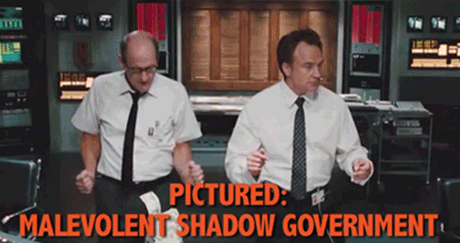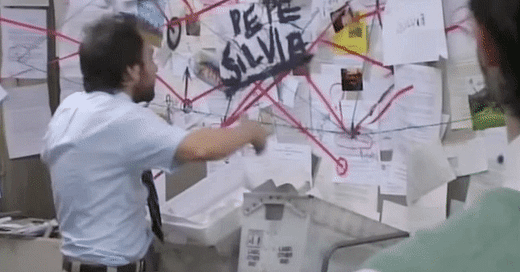Happy Wednesday!
As a treat (?!) for you today, I have written a special edition of the newsletter. It’s very long, and I hope to turn into a proper piece someday. It’s about the EVIL MSM so apologies if you find it navel-gazing. Do reply if you have thoughts.
Back to watching Boris Johnson tell a committee convened to question him what questions it’s allowed to ask him. At least these MPs are making journalists look good.
Helen
The Rise of Red String Journalism

Mr. Farrow, 32, is not a fabulist. His reporting can be misleading but he does not make things up. His work, though, reveals the weakness of a kind of resistance journalism that has thrived in the age of Donald Trump: That if reporters swim ably along with the tides of social media and produce damaging reporting about public figures most disliked by the loudest voices, the old rules of fairness and open-mindedness can seem more like impediments than essential journalistic imperatives.
Truly, the piece that launched a thousand tweets. I’m not sure that it convicts Farrow on the charges laid out - “resistance journalism” is surely anti-Trump activism, and Farrow hasn’t done much of that. (One of his stories discussed here is about misinterpreting a comment from a Clinton staffer to make her look bad.)
And it’s kinda funny that the writer is Ben Smith, formerly EIC of BuzzFeed, because there’s an argument that BuzzFeed was founded on “resistance journalism”, or rather its cousin, social-justice journalism. It famously rejected the idea of “objectivity” in the face of racism, sexism etc, which read at the time as a rebuke to the New York Times’s reluctance to, say, call Donald Trump a racist; it later published the speculative pee-tape dossier, a series of unsubstantiated claims about the president.
And yes, it’s bleakly funny that, as Margaret Sullivan notes, the reporting of #MeToo - a movement about the harassment and abuse of women - has become a brawl between Media Dudes.
But there is something to take away from this piece, beyond the beef, that has been bothering me for a while. Investigative journalists need to be incredibly aware of lapsing into conspiracism.
This is hard. I once commissioned Sarah Ditum to write a piece about Naomi Wolf, a natural conspiracy theorist who lucked into one conspiracy which actually exists (patriarchy). She then moved on to Assange, then the idea that Isis beheading videos were faked, and then to, in Vox’s words, “suggesting that the US was sending troops to West Africa not to assist with Ebola treatment but to bring Ebola back to the US to justify a military takeover of American society”. She also thought the Scottish independence referendum was rigged. It therefore shouldn’t have been a surprise that she was caught misinterpreting research in her book Outrages. Even less surprising was her reluctance to feel ashamed about it.
After the contrarian columnist Christopher Booker died, I asked someone who knew him well why such a good journalist on many subjects was also a climate change denier. His answer was that Booker, like others of his generation, was “ruined” by the thalidomide scandal. Then, the medical establishment insisted that their miraculous morning sickness drug couldn’t possibly have caused the birth defects seen at such unusual rates in the children of its users. Once journalists bust open that cover-up, they found it hard to believe in “the science” ever again.
This also explains the phenomenon of whistleblowers going . . . a bit funny. We all have a mental model of the world, and discovering a huge conspiracy shatters it. Who can be trusted? Who’s on my side? How close to the top does this thing go?

The Deep-Pan State
Humans love stories. We love their neatness, the feeling of satisfaction they give us, the way a pattern emerges from the chaos of experience.
Janet Malcolm famously wrote that “every journalist who is not too stupid or too full of himself to notice what is going on knows that what he does is morally indefensible.” She was talking about the impulse to establish ourselves as neutral arbiters, free from bias and agenda. What’s also necessary in journalism, and not always defensible, is turning facts into narrative.
Good investigative journalism is often, therefore, boring. (Go read the NYT’s early Harvey Weinstein stories and look at all the hedging, caution and space for rebuttal.) Plus, the first thing any screenwriter learns is: make your protagonist active. We like stories where people do stuff, where outcomes can be attributed to individual actions. Writing about flawed systems (the long wait to claim universal credit, or the fact it goes to the head of the household) is much harder.
Sometimes, we get journalism that looks, on the surface, like a hard-hewn exposé of systems, but invokes an individual consciousness: the hive mind of a giant shadowy network. Double bubble! It looks impressive and sweeping, and it has the satisfaction of agency too.
I call this Red String Journalism. And the internet loves it.

The very next piece I read after the Farrow one was this from Pink News (disclosure: they don’t like me). In case you can’t be bothered to click through, let me tell you the second sentence: “Back then, Amy was connected to an international network of powerful lesbians.” The report contains not a single name, event, group, document or verbatim quote which might substantiate the horrifying power of the International Lesbian Network. Amy might have a point, or not; it’s simply impossible to tell from this piece, because everything is vague intimation rather than concrete detail.
This, really, is the type of journalism that Ben Smith is crusading against. See also: it’s time for some game theory. Some of the flightier fancies about Cambridge Analytica. That bonkers Daily Mail investigation into one of the Leveson Inquiry assessors, which revealed over 11 breathless pages that he . . . was a trustee of some institutions. This one about Dominic Cummings and a coronavirus vaccine:


Liberal use of red string, and nothing you could capture in a sentence that would instantly convince people there was wrongdoing involved.
Worst of all, people read the Red String Journalism, and wonder why your journalism is so full of caveats, and so nitpickingly precise, when it could be gorgeously epic and satisfyingly neat.
Back Off, Man, I’m A Journalist
At the same time, there’s another strand to this story: the rise of the activist masquerading as a journalist. The first example I can remember is the ACORN controversy of 2009, where a conservative blogger and his friend posed as a sex worker and a pimp to get advice from a “leftwing” (scare quotes cos… American leftwing is not leftwing, is it, come on) community organisation. They went “undercover”, misleadingly edited the videos, and published them on a website belonging to Andrew Breitbart. Among other things, James O’Keefe dressed as a stereotypical pimp in the introductions, complete with fur coat and cane, but dressed normally for the ACORN visits.

This is not James O’Keefe.
The videos didn’t obey any of the conventions of journalism, but they were enough to get ACORN shut down. (Incidentally, this is why I’m a sceptic of the problem of “deepfakes” or AI-altered videos. We don’t need sophisticated AI to misrepresent reality. The problem is already here.)
Now, everyone’s a journalist. Nigel Farage has been breaking lockdown - he’s allowed to, apparently, because of being a journalist - to “report” on migrant boats landing at Kent. He posts his “reportage” on YouTube and Facebook.
Farage’s preferred frame is “why is the MSM not covering this”, and god, it’s a popular one. As is often the case, though, the MSM is covering this. Here’s a BBC Kent story from this week. Here are at least four more the BBC website has published in May:

What’s broken here is that conspiracism beats facts. It’s sexier. Nigel Farage complaining about the lack of stories on migrant boats attracts more readers, and more interest, than stories on migrant boats. Throughout my time at the NS, I could see this in the website traffic. We made a rule not to invoke “there’s something about X that no one has spotted” unless it was absolutely justified. But when we did, it was like turning on a traffic hose. A lot of the time, audiences don’t just want facts. They want to know how to feel about them, too.
It reminds me of Adam Curtis’s concept of “oh dearism”, the idea that news reports about tragedies, when they don’t have clear goodies and baddies, often provoke nothing more than a sigh. Conspiracy theories restore this concept of good and bad, even if there’s no obvious perpetrator, because the great unifying force (Jews, feminists, the deep state) is the actor*.
As Alan White says, a bastardised, counterfeit version of ‘investigative journalism’ has taken its place in the [culture] war”, at the same time as actual investigative journalism has faced terrible funding challenges. It is so expensive, not just in reporting costs, but legal ones, and advertising funding cannot cover it, so ad-funded media can only ever do it as a loss leader.
The “just asking questions” frame is here deployed superbly by Donald Trump, to suggest casually to his 80 million followers that an MSNBC journalist committed a murder:


This is the president of the US playing amateur gumshoe/Woodward and Bernstein. It has had real world consequences: the woman who died left behind a widower, who has been harassed as a result of these tweets. (The woman had an undiagnosed heart condition, fell down, and hit her head in Joe Scarborough’s office.) So have the family of Seth Rich, the Democratic staffer whose suicide was framed by Trump outriders as a deep state conspiracy overseen by Hillary Clinton. So have the parents of the children killed at Sandy Hook, accused by Infowars’ Alex Jones of being “crisis actors”.
Don’t Worry, I’m Nearly Done
This background - of fake investigative journalism - is why actual reporters should be intensely careful about indulging in Red String Journalism. You are feeding a beast which will devour you, and our whole profession. There’s a lesson for readers, too: I often see people I otherwise respect retweeting Red Stringery, as if they have no responsibility at all not to amplify garbage.
I should declare an interest, here. Fact-checking is a nightmare, and I’m not even an investigative reporter. Pretty much everything I write is based on publicly available facts or existing reporting. But god, it’s a slog nonetheless. And your own memory is no help. I once wrote a piece about a film I had seen THREE times and confidently asserted that the main character had her hair in a ponytail in the first scene. She did not. It just fitted with my perception of her character.
* Side note: it’s funny that both Boris Johnson and Donald Trump have invoked the deep state, when they are the. . . shallow state? Here’s Johnson in 2019: “If we think that by coming up with all kinds of complicated amendments and delaying tactics, we are going to fool the British public, we will manage to frustrate Brexit, I think we will reap the whirlwind. . . I think that people will feel betrayed. And I think they will feel that there has been a great conspiracy by the deep state of the UK, the people who really run the country, to overturn the verdict of the people.” That deep state in full: parliament, including 21 semi-Tory MPs.
Anyway, now he’s PM, he must have found out who “the people who really run the country” are. Amazing he hasn’t outed them, really, bust this thing wide open.
If you like this newsletter, please spread the word and retrospectively justify the time I just spent on Nigel Farage’s Facebook page: helenlewis.substack.com



Agree. And you even inadvertently illustrate the horrors of factchecking. Seth Rich was killed in a mugging. Vince Foster is the man who committed suicide that they say Hillary Clinton actually killed. But yes Seth Rich is the Vince Foster of the 2016 election. And of course I can’t believe I know all this ridiculous conspiracy theory crap. 🤢